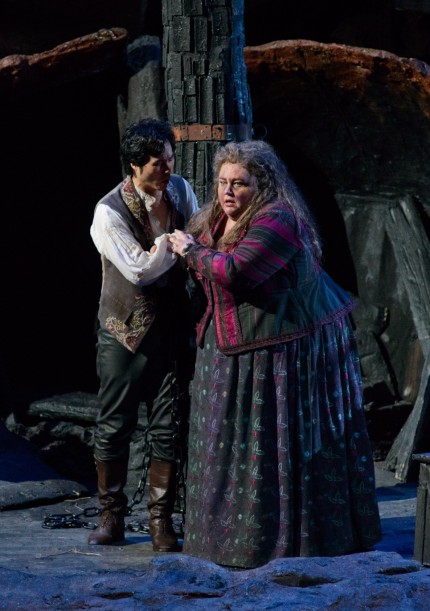Lyric Opera delivers the vocal thunder in a dark and combustible “Trovatore”
An apt target for skewering by the Marx Brothers and even before, Il Trovatore, with its impenetrable plot of ancient blood hatreds, mixed-up babies, gypsy hags, swordplay, and poison potions, virtually defines and catalogs the absurdities of the genre.
Yet even with its preposterous scenario, Trovatore has survived because it contains so much magnificent music, chock-a-block with more famous set pieces than any other middle-period Verdi opera.
It seems like Lyric Opera can do no wrong this season. With some sensational Verdi vocalism, first-class conducting and a highly effective David McVicar production, Monday night’s opening performance of Il Trovatore served up yet another inspirational night of opera on Wacker Drive.
McVicar has become a fixture at Lyric, and the British director’s take on Trovatore is one of his finest stagings to date. The fizzing yet traditional production, unobtrusively updated to the Spanish Civil War, avoids the many pitfalls by deftly transcending the rickety scenario and taking the primal, often violent emotions and motivations of the characters seriously. Charles Edwards’ bleakly austere rotating sets with their towering stone walls effectively paint the castle walls, gypsy camp and cloister. A crucified prisoner hangs in the shadows, knives are impulsively drawn, the swordplay feels real, and the soldiers cavort with slatternly whores. There is a prevailing sense of brooding amorality in McVicar’s production that suits the violent downbeat tale.
None of this would matter if Lyric failed to field a cast up to this intensely challenging score and, with some reservations, the company indeed delivered the vocal blood and thunder.
While the four principals all tackled their parts impressively, this Trovatore is so dominated by Stephanie Blythe’s Azucena that for these performances the company should just change the outside sign to La Zingara (The gypsy).
Blythe doesn’t quite possess the low contralto tones one would like for the embittered gypsy. But she is such a wonderful singer and resourceful actress that she brought a surprisingly layered depth and dimension to the often-caricatured role.
This was not just a weird old witch but a woman of titanic emotions who committed a horrendous crime—throwing an infant into a fire—out of misplaced family loyalty to her mother and her son, Manrico. Blythe deployed her vast mezzo with consummate skill, from her gutsy and agile “Stride la vampa” to her cumulative emotional intensity in the ensuing narrative and touchingly nostalgic regret in the duet “Ai nostri monti.”
Amber Wagner is that current vocal rarity, a true Verdi soprano with the power and luxuriant richness of tone to tackle the demanding role of Leonora. At times one wanted a smoother legato, and the former Ryan Center artist seemed to tire a bit after intermission with some ragged phrase endings and a choppy and unwieldy “D’amor sull’ali rosee.”
Yet for the most part, Wagner rose to the demands of this taxing role magnificently. Her “Tacea la notte” was beautifully rendered, the ensuing cabaletta light and neatly articulated. She brought fine fervor to the Act 1 trio and the ensembles throughout, rising to the heights of the final scene with luminous tone and dramatic point. Wagner also has become a more confident actress, and while the role of Leonora doesn’t offer much range, Wagner created a more emotionally rounded character than most.
Quinn Kelsey has clearly become Lyric’s favored go-to Verdi baritone, and the Ryan Center alum proved an explosive presence as Count di Luna. Kelsey’s beefy instrument is not a thing of tonal beauty and in “Il balen del suo sorriso” one wanted more Italianate sweetness on top. Yet he sang with supreme fire and conviction, his big voice cutting through the ensembles with ease. Dramatically, Kelsey etched a more psychologically complex Count than the cardboard villain of tradition, his di Luna, a brutal and unstable man, even roughly manhandling Leonora and pulling her hair.
As Manrico, Yonghoon Lee seemed to be steeling himself for the challenge of “Di quella pira.” He nailed the top notes but his low notes disappeared and he didn’t sing the phrases accompanying the chorus altogether.
That jarring lapse apart, the Korean tenor sang with imposing power and lyric sensitivity. His “Ah! si, ben mio,” was especially urgent and impassioned, and Lee’s high notes rang out with clarion impact in the ensembles. He also blended sensitively with Wagner and was at his finest in the final scene. As an actor, Lee’s Manrico cut a more vivid figure than his Don Jose in his 2010 Lyric debut in Carmen—at times nearly as emotional and dangerous as the villainous di Luna.
Andrea Silvestrelli is a game colleague, taking the small role of Ferrando on his nights off from singing the Commendatore in Lyric’s Don Giovanni. With his towering stature and booming voice, the Italian bass made much more out of the character than usual, even carrying one of the slatterns offstage over his shoulder, and his long Act 1 narration was a lesson in vocal story-telling.
J’nai Bridges, a star in the making, likewise brought more detail to the servant Inez than the usual cypher.
Revival director Leah Hausman handled the large chorus and vast number of extras fluidly and efficiently. There were a few mishaps opening night, including some overcaffeinated supers and a cartoonish Bickersons-type argument between a gypsy couple, which should be rethought or at least moved off center stage.
Even by their current elevated standard, Michael Black’s chorus sang with tremendous strength and sonorous impact, with the soldier’s choruses especially resounding.
Asher Fisch led a keenly concentrated yet flexible performance that kept fine tension throughout—accenting Verdi’s strange, unsettling counterpoint yet opening up with resplendent string tone for the big lyrical moments. The bracing metallic percussion was rhythmically right on point in the Anvil Chorus, characteristic of the scrupulous care Fisch brought to this score. The Lyric Opera Orchestra played at their usual high level throughout the evening.
Il Trovatore runs through November 29. lyricopera.org; 312-332-2244.
Posted in Performances





